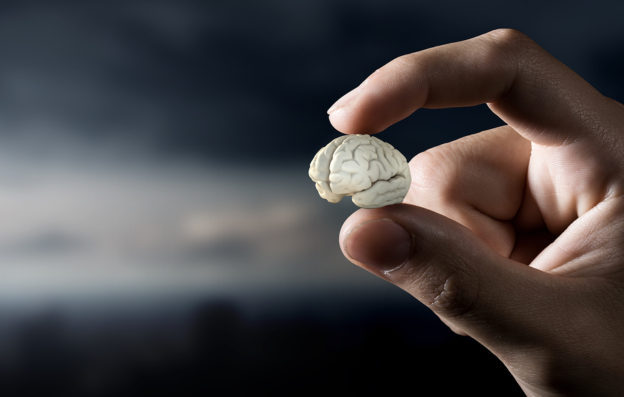By David Blyweiss, M.D., Advanced Natural Wellness
June 29, 2016
- Over-the-counter allergy meds linked to Alzheimer’s and dementia
- Are antihistamines shrinking your brain?
- Here’s how to relieve allergy symptoms… without losing brainpower
I don’t think I know a single person who has never taken an antihistamine. In fact, the use of these over-the-counter drugs is so commonplace that it’s easy to forget that they come with serious side effects.
One of the worst, by far, is their link to the development of Alzheimer’s and dementia.
You see, many of these drugs are “anticholinergics”. In essence, they block the action of the neurotransmitter acetylcholine.
This is the chemical messenger that fuels your memory and cognitive function. It also transmits messages throughout your entire nervous system and stimulates muscle contractions.
So taking drugs that mess with it is never a good idea.
Now, just last year we found that taking anticholinergics – like Benadryl, Mucinex, Sudafed or Contac – for between one and two years increases your chances of dementia by 23%. Taking them for three or more years kicks that risk up to 54%.
Open your arteries, improve blood flow for a new health miracle...
Did you know your circulatory system has over 60,000 miles of arteries, veins and other blood vessels, if stretched end to end?
But as you age, your blood vessels undergo changes, which may cause them to stiffen, thicken and get clogged.
GOOD NEWS! Doctors have now identified a “Miracle Molecule” inside your arteries that helps OPEN your arteries and IMPROVE blood flow.
It’s what Dr. Valentin Fuster calls it, "One of the most important discoveries in the history of cardiovascular medicine."To you, that means...
- Healthy blood pressure
- Sharper mind and memory
- Skyrocketing energy and muscular strength
- Increased pleasure and passion in the bedroom
- Improved circulation to every cell and organ in your body
Go here to discover a new natural way to significantly boost the levels of this miracle molecule in YOUR body NOW!
And in recent months we’ve learned even more about the effect these drugs can have on your brain.
Antihistamines Shrink Your Brain
People who take anticholinergic drugs perform much worse on cognitive tests than people who don’t take them. They tend to affect your short-term memory, verbal reasoning, planning skills and ability to solve problems.
But is it simply low levels of acetylcholine that causes these problems?
That’s certainly one part of the puzzle. But there’s another one that is much more disturbing.
It turns out that folks who use these drugs also have reduced brain volume. Their brains are literally shrinking!
Plus, people taking anticholinergics have lower levels of glucose metabolism – a biomarker for brain activity – in the hippocampus. Even worse, reduced cholinergic activity is linked to an increase in hippocampal cell death.
Are You Suffering From...
- Love handles and a pot belly
- Romance that isn't what it used to
- Forgetfulness and inattention
- Low (or no) strength and endurance
- A sex drive that's shifted into neutral...or worse
If so...you may have Mature Male Burnout. Click here to discover more about this unique condition and what you can do about it.
This is the region of the brain associated with memory. And it’s the one where Alzheimer’s strikes first – even before any symptoms appear.
Now, I often see patients who take these drugs daily to control sinus problems, help them sleep better and shut down hay fever symptoms.
If this sounds like you, here are a few words of advice.
Relieve Allergy Symptoms without Losing Brainpower
To take control of allergy and hay fever symptoms, the first thing you should do is stock up on colorful fruits and veggies. Apples, citrus fruits, grapes, broccoli, red onions, tomatoes and green leafy vegetables are all packed with allergy-fighting quercetin that blocks histamine release.
I also recommend taking a butterbur supplement. It contains a substance called petasine that’s just as good as an antihistamine, but without the drowsiness. I recommend 50 to 75 mg of a standardized supplement twice a day.
Nettle is another natural antihistamine that contains anti-allergenic compounds. These help boost your resistance to pollens and molds. And it goes to work quickly. Take 870 mg of a freeze-dried extract whenever symptoms arise.
For chronic sinus problems, add the powder from one probiotic capsule to your regular nasal flushes. Use a neti pot, rubber ear bulb or spray bottle to deliver it into your nasal passages.
And if you’ve been taking an antihistamine for awhile now, it’s important to restore your levels of acetylcholine. This is also a good idea if you take other anticholinergic drugs – like sleeping pills, overactive bladder medications, Paxil or Demerol. Here’s a chart of all drugs with known anticholinergic activity.
The best way to do this is to supplement with CDP-choline (also known as citicoline). Just 100 mg daily can help improve verbal memory and effectively treat age-related mental decline.
Don’t let over-the-counter antihistamines rob you of your brainpower. Take these natural steps to boost your immunity and relieve your symptoms – without dangerous side effects.
SOURCES:
Gray SL, et al. Cumulative use of strong anticholinergics and incident dementia: a prospective cohort study. JAMA Intern Med. 2015 Mar;175(3):401-7.
Risacher SL, et al. Association Between Anticholinergic Medication Use and Cognition, Brain Metabolism, and Brain Atrophy in Cognitively Normal Older Adults. JAMA Neurol. 2016 Apr 18.
Parks HH, et al. Flavonoids inhibit histamine release and expression of proinflammatory cytokines in mast cells. Archives of Pharmacal Research. 2008;31:1303-1311.
Shimoda H, et al. Anti type I allergic property of Japanese butterbur extract and its mast cell degranulation inhibitory ingredients. Journal of Agricultural and Food Chemistry. 2006;54:2915-2920.
Roschek B Jr, et al. Nettle extract (Urtica dioica) affects key receptors and enzymes associated with allergic rhinitis. Phytotherapy Research. 2009;23:920-926.
Secades JJ, et al. “Citicoline: pharmacological and clinical review, 2006 update.” Methods Find Exp Clin Pharmacol. 2006 Sep;28 Suppl B:1-56.
Abreu NA, et al. Sinus microbiome diversity depletion and Corynebacterium tuberculostearicum enrichment mediates rhinosinusitis. Sci Transl Med. 2012 Sep 12;4(151):151ra124.







